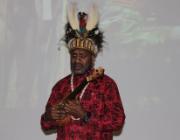
A two time nominee for the Nobel Peace Prize and exiled tribal chief of West Papua, Benny Wenda, delivered a public lecture on 24 February to a packed lecture theatre, decorated with the West Papau flags as Wenda was sentenced to 25 years in prison for the simple act of raising the West Papua flag.
The lecture delivered at Rhodes University is one of the many public lectures that will be delivered around South Africa in the Free West Papua campaign.
Opening with a moving tribal song, he wrote while imprisoned, Mr Wenda explained that although he managed to escape from prison there are still many political prisoners in West Papau. During his address he shared stories of horrific human rights abuses that take place on a daily basis in his home country.
After seeking exile in the United Kingdom he started the Free West Papua Campaign in 2004 with the aim of it being the voice of the West Papuans who are still under Indonesian control.
The exiled leader’s quest in South Africa is not only to enlighten South Africans about the plight of the West Papuans but also to ask for help so that the people of West Papua may gain their freedom.
He said South Africa’s political history resonates with the current state faced by his people giving a visual comparison of the current state of West Papua to that of apartheid South Africa.
He displayed images of how the rights of his people are being violated by the Indonesians, touching on issues such as media freedom which has been totally banned and also how West Papua in the 21st century is still under heavy military control.
Mr Wenda stressed the importance of his mission here in South Africa and other countries around the world. The mission which is to free the people of West Papua giving them “self-determination” so that they may choose their own destiny through a fair and transparent election.
He thanked South Africa for the role it has played which has been very effective in helping spread awareness about West Papua on International platforms such as the United Nations.
Article by: Nomfundo Lukwe
